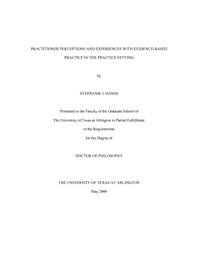
ATTENTION: The works hosted here are being migrated to a new repository that will consolidate resources, improve discoverability, and better show UTA's research impact on the global community. We will update authors as the migration progresses. Please see MavMatrix for more information.
Show simple item record
| dc.contributor.author | Hamm, Stephanie J. | en_US |
| dc.date.accessioned | 2008-08-08T02:31:16Z | |
| dc.date.available | 2008-08-08T02:31:16Z | |
| dc.date.issued | 2008-08-08T02:31:16Z | |
| dc.date.submitted | May 2008 | en_US |
| dc.identifier.other | DISS-2084 | en_US |
| dc.identifier.uri | http://hdl.handle.net/10106/987 | |
| dc.description.abstract | Evidence-based practice (EBP) in the profession of social work is a current concern in the response to a need to be accountable to the profession, clients, and the broader society. This approach to practice, introduced by the medical profession, includes researching and seeking research on interventions for practice that have been supported in previous findings. The purpose is to create the opportunity to offer the best practice interventions to client systems, in micro or macro practice. The current focus in social work is the question of implementation into practice and higher education, if indeed, EBP is a shift in the profession. Part of EBP is the utilization of the process of EBP, as incorporated from Sacket et al (2000), by Gambrill (2006). This five-step process includes formulating a practice question, seeking evidence of best interventions, evaluating the evidence, evaluating the implemented intervention, and disseminating findings. Part of the discussion of integrating EBP into the field of social work is discovering what practitioners have to say about EBP and what is needed in order to create an environment for practitioners to utilize EBP.
This study is an investigation into practitioner perceptions and experiences of EBP. A survey questionnaire was given to practitioners (n=140) in a metropolitan area of Texas. The survey included questions and subscales for the purpose of learning practitioner attitudes, EBP skill level, level of training, and level of EBP use. Using EBP use as a dependent variable, statistics were run that reveal correlations of the variables to EBP use. Linear regressions were run in order to predict professional characteristics of EBP practitioners. Two important findings were that time limitations emerged as the most important barrier to EBP use, and that the single most significant predictor of EBP use, over and above all others, is EBP skill level. These, among others have important implications for social work practice, research, policy, and education. | en_US |
| dc.description.sponsorship | Elliott, Doreen | en_US |
| dc.language.iso | EN | en_US |
| dc.publisher | Social Work | en_US |
| dc.title | Practitioner Perceptions And Experiences With Evidence-based Practice In The Practice Setting | en_US |
| dc.type | Ph.D. | en_US |
| dc.contributor.committeeChair | Elliott, Doreen | en_US |
| dc.degree.department | Social Work | en_US |
| dc.degree.discipline | Social Work | en_US |
| dc.degree.grantor | University of Texas at Arlington | en_US |
| dc.degree.level | doctoral | en_US |
| dc.degree.name | Ph.D. | en_US |
| dc.identifier.externalLink | https://www.uta.edu/ra/real/editprofile.php?onlyview=1&pid=379 | |
| dc.identifier.externalLinkDescription | Link to Research Profiles | |
Files in this item
- Name:
- umi-uta-2084.pdf
- Size:
- 3.116Mb
- Format:
- PDF
This item appears in the following Collection(s)
Show simple item record


